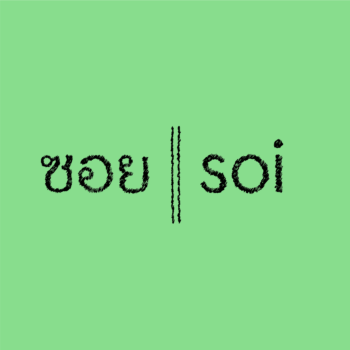
ร่างแรกของสคริปต์นี้เขียนระหว่างโดยสารแกร๊บไบท์ระยะทางจากเซ็นทรัลเวิร์ลไปสีลมในเย็นวันหนึ่ง.
ก่อนหน้าที่จะวิ่งขึ้นรถ คือบทสนทนากับนักเขียนสองคน หนึ่งในนั้นกำลังจะได้ตีพิมพ์ผลงานในภาษาอังกฤษ และผู้จัดพิมพ์ขอให้นักเขียนเปลี่ยนไปใช้ชื่อจริงภาษาไทยบนปกหนังสือ แทนนามปากกาภาษาอังกฤษที่เธอใช้มาตลอด เหตุผลก็คือ ชื่อเดิมนั้น ‘ฟังดูไม่ Southeast Asian’ มากพอ
นับว่าเป็นตลกร้าย แต่ไม่เหนือความคาดหมายอะไร
เราจึงถามต่อว่า แล้วทำไมถึงยอมล่ะ? นักเขียนตอบว่า เพราะตอนนั้นรู้สึก desperate มาก จนผู้จัดพิมพ์ให้ทำอะไรก็ยอม
ในสนามที่ต้องดำผุดดำว่ายอย่างลำพัง นักเขียนก็มักจะเจอเหตุการณ์ทำนองนี้
.
ทำไมนามปากกาที่นักเขียนคนหนึ่งใช้ในบ้านตัวเองจนเป็นที่รู้จักในหมู่นักอ่าน กลับไม่ ‘แท้’ พอสำหรับผู้ที่มองเข้ามา? แล้วอะไรคือความเป็น ‘Southeast Asian’? ไม่ใช่ว่าอัตลักษณ์และความบริสุทธิ์ดั้งเดิมเทือกนี้มันก็เป็นนิยายดีๆ ชิ้นหนึ่งหรอกหรือ?
มันอาจเป็นนิยายพอๆ กับความเป็นไทย ไทยแท้ดั้งเดิม แบบไทยๆ ช้างไทย มวยไทย กล้วยไม้ การไหว้ โขนไทย วัดวัง เจ้าฟ้าเจ้านาย หรืออะไรสารพัดที่กระทรวงวัฒนธรรมและหน่วยงานรัฐยังคงสามารถเวียนใช้เป็นพล็อตไว้ ‘ขาย’ ในเวทีนานาชาติ
นิยายพล็อตนี้บอกความจริงอย่างหนึ่งกับเราว่า เรา – ไพร่ฟ้าประชาชน – ยังถูกทำให้ ‘เป็นอื่น’ ต่อตัวเองทั้งในบ้านและนอกบ้าน คุณค่าที่กำกับการเมืองวัฒนธรรมเช่นนี้ยิ่งซับซ้อนขึ้นไปอีกเมื่อเราลงไปเล่นอยู่ในพื้นที่ที่เรียกกันว่า ‘นานาชาติ’
.
ตกลงแล้ว ‘Southeast Asia’ คืออะไร? มันไม่ใช่ภูมิภาคที่เพิ่งถูกสร้างขึ้นมาเหมือนกันหรอกหรือ?
ชีวิตแบบ adrenaline rush บนมอเตอร์ไซค์ นับจุดร่วมหนึ่งของ Southeast Asia ได้หรือไม่? — ภูมิภาคที่โครงสร้างสาธารณะไม่สมประกอบ เลยต้องมี ‘makeshift’ เข้ามาช่วยทำให้ชีวิตเดินไปได้แบบพอถูพอไถ ฟังเป็น ‘Southeast Asian’ ได้บ้างมั้ย?
นี่ก็เป็นเหตุผลที่เราเรียกตัวเองว่า ‘ซอย’ — เป็น ‘โครงสร้างสำรอง’ เป็นแผนทำงานชั่วคราวระหว่างที่เรายังไม่มีอะไรรองรับ เป็นเหมือนซอกซอยที่มีไว้เชื่อมต่อถนนใหญ่ที่ติดขัดจนสัญจรได้ยาก
.
soi literary จึงเกิดจาก ‘การแก้ปัญหา’ ตั้งแต่ต้น เกิดมาจากการทำงานกับต้นฉบับแปลอังกฤษของอุทิศ เหมะมูล ที่เราถามต่อไปว่า เมื่อทำต้นฉบับเสร็จแล้ว มันจะไปไหนต่อ [คล้ายๆ กับคำถามว่าตายแล้วไปไหนล่ะมั้ง] แล้วที่สำคัญคือ ใครจะเป็นคนพามันไป?
soi literary ไม่ได้ผุดเกิดจากไอเดียสูงส่งอะไร มันเกิดจากความขัดสนของอุตสาหกรรมภายในประเทศนี่แหละ — เราหวังว่าเราได้ทำสิ่งที่พอทำได้ นี่น่าจะเรียกว่าความใฝ่ฝันเล็กๆ ของเรา มองไกลกว่าหน่อยก็คือเราฝันว่าคนรุ่นต่อไปจะไม่ต้องย่ำอยู่กับการ ‘สร้างฐาน’ จนติดแหง็กไปไม่ถึงไหนกันซักที ที่พูดเช่นนี้เพราะเราก็ระลึกเช่นกันว่าซอยเองก็ติดหนี้คนรุ่นก่อนหน้าที่พยายามทำงานเบิกทางมาอย่างโดดเดี่ยว ในวาระนี้ เราคงไม่สามารถเอ่ยนามบุคคลเหล่านั้นได้จนครบถ้วน
.
ระยะเวลา 3 ปีที่ผ่านมา soi literary เรียนรู้ผ่านการกระโดดเข้าไปสนามที่ไม่ได้มีใครสอนวิธีการเล่นให้กับเรา หรือเรียกอีกทางก็คือเรา ‘learn it the hard way’ เราลองทำหลายๆ อย่าง และผลจากการลงเล่นก็ไม่ได้โดยด้วยกลีบกุหลาบสวยงามทั้งหมดอย่างแน่นอน เราลองเพื่อจะหาวิธีที่จะไปต่ออย่างก้าวหน้าได้ เราหวังว่าจะท้าทายหรือเปลี่ยนกฎของสนามนี้ขึ้นมาได้บ้าง แบบที่เล่นแล้วรู้สึกสนุกขึ้นมาอีกหน่อย – ไม่ว่ากระบวนท่านั้นจะเป็นการสะกิดเบาๆ เขย่าแรงๆ หรือถอนมันออกมาทั้งยวงก็ตาม
.
.
ในช่วง 3 ปีที่ทำงานข้องเกี่ยวอยู่กับวรรณกรรมไทย เรามักจะได้ยินคำพูดผ่านหูทำนองว่า:
>> วรรณกรรมไทยมันยัง ‘ไม่ถึง’
>> วรรณกรรมไทยมันสู้ ‘ที่อื่น’ ไม่ได้
ไอ้คำว่า ‘ที่อื่น’ ที่ใช้เป็นจุดอ้างอิงของความ ‘ถึง’ ไม่เคยเป็น ‘ดินแดน’ ที่อยู่ในระยะเดินเท้าข้ามชายแดนก็เจอเลย เพราะคำนี้มักหมายถึงพื้นที่ที่แดนไกลต้องโดยสารด้วยเครื่องบินยาวนานเป็นวันหรือข้ามวัน
แต่หากจะพูดกันเรื่องความ ‘ถึง-ไม่ถึง’ โดยไม่คิดสร้างพื้นที่ให้คนทำงานสามารถแสดงศักยภาพที่แท้จริง — แล้วเราจะตัดสินกันได้ง่ายๆ เหรอว่าใครมีหรือไม่มีความสามารถแค่ไหน? เราจะคุยกันถึง ‘คุณภาพ’ ได้อย่างเต็มปากเหรอในเมื่อสิ่งเหล่านี้ไม่เคยเป็นเรื่องของปัจเจกบุคคล ‘อัจฉริยะ’ คนไหนก็ไม่ได้เก่งขึ้นมาเพราะตัวเองเพียงลำพัง
.
ขอถามหน่อยสิ:
เรามีจินตนาการกันมากแค่ไหน? เห็นความเป็นไปได้อยู่ตรงไหนบ้าง? หรือแค่วนเวียนอยู่กับการบ่นถึงข้อจำกัด ติติงติฉินกันในวงปิด และคอยให้ความชอบธรรมกับความเป็นไปไม่ได้ที่กลายเป็นทัศนคติมากกว่าสภาพความเป็นจริง?
หลายๆ คนที่อยู่ ณ ที่นี่ ตอนนี้ ก็ทำงานและผลักดันสิ่งต่างๆ มานาน น่าจะเข้าใจรสชาติขมแปร่งในสนามเหล่านี้ได้ดี และน่าจะรู้ดีว่าความสว่างวาบและความเข้าใจที่ละเอียดลออเกิดจากการลงมือทำงาน ที่หลายๆ ครั้ง ต่อให้หนังสือหรือทฤษฎียาวกี่หน้าก็ไม่อาจเป็นแสงส่องนำทางให้เราได้
.
ในช่วงเดือนมิถุนายนที่ผ่านมา ทีมซอยได้จัด literary forum ที่เรียกว่า The Parameters of Our Stories ร่วมกับสนพ. Tilted Axis จากประเทศอังกฤษ เราได้เชิญนักเขียน นักแปล ผู้จัดพิมพ์ คนทำงานในหน่วยงานเอกชนและภาครัฐจากประเทศต่างๆ ในภูมิภาคนี้ให้มาเจอกันที่หอศิลป์กรุงเทพ
ช่วงหนึ่งของบทสนทนา มีการอ้างถึงประโยคของนักวิชาการคนหนึ่งที่บอกว่า ‘None of the national languages of Southeast Asia has any transnational aura. สิ่งที่เราต่อประโยคนั้นไปก็คือว่า ‘aura is not god-given, but constructed.’ — ออร่า หรือการเปล่งประกายฉายแววของงานศิลปะ ไม่ได้มาเพราะจากฟ้าหรือเจ้าแผ่นดินประทานให้ มันไม่ใช่ ‘พร(จาก)สวรรค์’ มันไม่เคยเป็นเรื่องของปัจเจกผู้วิเศษเหนือใคร แต่มันคือการร่วมกันขึ้นมาจากพื้นที่เราเหยียบยืน
คำถามก็คือว่า โอกาสในการสร้างของแต่ละคนมันมีอย่างเท่าเทียมกันแค่ไหน? แน่นอนว่าคำถามนี้คุ้ยค้นไปถึงข้อจำกัดของสิ่งแวดล้อม โดยที่ไม่ได้ละเลยปัจจัยภายในจนเสียสิ้น
.
ขอเอ่ยถึงคำพูดของเจ ชนาธิป นักบอลไทยที่พูดไว้ทั้งน้ำตาว่า:
“ประเทศไทยจะสนับสนุนเราตอนที่เราประสบความสำเร็จ นี่คือเมืองไทย เค้าอยากซื้อความสำเร็จ แต่ไม่ได้อยากสร้าง ถ้าเราสร้าง วันหนึ่งเราจะสำเร็จ แต่การสร้างมันยากกว่าอยู่แล้ว หลายคนชอบผม เพราะผมเป็นชนาธิปอย่างทุกวันนี้ แต่เค้าไม่รู้ว่าผมถูกสร้างมายังไง…”
.
และนี่คือสิ่งที่เราตระหนักดี:
>> สิทธิในการเข้าถึงทรัพยากร และโอกาสในการพัฒนาตัวเองจากทรัพยากรนั้น คือสิทธิขั้นพื้นฐานของประชาชน << แค่เรื่องนี้ ในตอนนี้เรายังแทบไม่มีกันเลย
ส่วนนี่คือข้อเสนอของเรา:
ผู้ร่วมวิชาชีพไม่ควรเล่นกันอยู่แค่ในระบบการแข่งขันตามกลไกตลาด เพราะตลาดที่ว่ามันเล็กเกินกว่าที่แข่งแล้วจะมีผู้ชนะที่แท้จริง แต่เราสามารถร่วมกันเล่นเพื่อหาทางชนะร่วมกันได้
สำหรับผู้กำหนดนโยบายทางวัฒนธรรมของรัฐ >> พวกท่านควรทำความเข้าใจกลไกการผลิตทางวัฒนธรรมตั้งแต่ต้นจนปลาย และส่งเสริมให้การผลิตเหล่านั้นเป็นไปได้ ไม่ใช่ทำหน้าเป็นผู้สั่งสอนด้วยการผลิตเนื้อหาจากส่วนกลางยัดเยียดจากบนลงล่าง รัฐต้องสนับสนุนการเติบโตของ ‘ประชาชนผู้สร้าง’ ในกระบวนการนี้ก็คือการโยงผู้ผลิตในแบบต่างๆ เข้ามาเจอกัน รวมถึงสร้าง/เชื่อมต่อทางใหม่ๆ ให้เกิดความเป็นไปได้มากที่สุด ไม่ใช่ธุระกงการอะไรของรัฐที่จะเฝ้าระวังหรือกำกับเนื้อหา แต่รัฐควรมุ่งมั่นผลักดันระบบเพื่อให้การผลิตและการกระจายสินค้าทางวัฒนธรรมเป็นไปได้อย่างมีประสิทธิภาพและยั่งยืนได้จริง
นี่คือประเด็นเรื่อง production และ logistics ที่เราขอเสนอให้ขยายเป็นนโยบายทางวัฒนธรรมในแขนงต่างๆ อย่างละเอียดมากขึ้นในอนาคต
เหล่านี้คือสิ่งที่เราหวังจะทำให้ได้มากที่สุด ก่อนที่เราจะไม่มีแรงทำมัน…
.
ก่อนจบ ขอแทรกคำอวยพรจากเพื่อนคนหนึ่งที่ส่งมาให้เมื่อคืน หลังจากเจ้าตัวรู้ว่าจะมาร่วมงานวันนี้ไม่ได้:
‘เอาใจช่วยให้งานของเอ็งและพรรคพวกของเราลุล่วง ราบรื่น สนุกเท่าที่ประชาชนควรจะสนุก ก้าวหน้าเท่าที่สติปัญญาของประชาชนจะเดินหน้าพากันไป’
.
 ดิฉัน จุฑา สุวรรณมงคล ขอต้อนรับแขกทุกคนที่มาร่วมงานเปิดตัวหนังสือ The Fabulist ของอุทิศ เหมะมูลในวันนี้
ดิฉัน จุฑา สุวรรณมงคล ขอต้อนรับแขกทุกคนที่มาร่วมงานเปิดตัวหนังสือ The Fabulist ของอุทิศ เหมะมูลในวันนี้
ขอแสดงความยินดีกับอุทิศ เหมะมูลที่งานเขียนได้เกิดใหม่ในภาษาอื่น และเราหวังร่วมกันว่าจะมีครั้งอื่นๆ ตามมาในไม่ช้านี้
ขอแสดงนับถือและชื่นชมความอุตสาหะของนักแปล – ปาลิน อังศุสิงห์และพลอย กิ่งชัชวาลย์ ที่ตั้งใจทำงานแปลชิ้นนี้จนสำเร็จออกมา
การเฉลิมฉลองจะมีค่าก็ต่อเมื่อเราจำได้ว่าช่วงเวลามืดมิดที่ยาวนานกว่านั้นมันเป็นยังไง — พลุสีสวย สว่างวาบ เสียงดัง ก็มีเพื่อเตือนเราว่า มันยังมีการทำงานอย่างอดทนที่กินเวลายาวนานและเงียบเชียบกว่าเสมอ
ในฐานะตัวแทนของซอย ขอขอบคุณทุกคนที่ให้การสนับสนุนและเชื่อในความตั้งใจของเรา และหากมีข้อผิดพลาดใด เราขอน้อมรับไว้เพื่อปรับปรุง
สำหรับในคืนนี้ ขอให้ทุกคนสนุกสนานกับงานจุดพลุสังสรรค์ ขณะเดียวกัน ขอให้อย่าลืมความมืดมิดหลังจากนี้ที่ยาวนาน จนกว่าเราว่ามีพลุให้จุดอีกรอบค่ะ
The first draft of this script was written one evening while riding a Grab bike from Central World to Silom.
Moments before hopping onto the motorbike was a conversation with two authors. One of them is about to have their work published in English and were told by the publisher to use their real Thai name on the cover instead of the English pen name they’d been using their entire career. The reason: their pen name does not ‘sound Southeast Asian’ enough.
How ironic, but not unexpected either.
I pressed on to ask why they complied. “Because I was desperate at the time. I’d do anything the publisher says,” they answered.
This is a common occurrence for authors who are struggling to keep their heads above water in this industry, all alone.
.
How can a pen name that the author is recognised for in their own home not be considered ‘authentic’ enough for an outsider? What, then, is essentially ‘Southeast Asian’? Isn’t this kind of authenticity or purity attached to identity another seamless piece of fiction?
It may be as equally fictitious as ‘Thainess’, as what is considered ‘authentically Thai’, like Thai Thai: Thai elephants, Thai boxing, orchids, wai, khon, temples, palaces, kings and masters — or whatever else the Ministry of Culture or public organisations can still recycle into a plot that ‘sells’ on the international stage.
However, there is truth in every fiction and this one tells us that we – commoners – are made to feel ‘estranged’ from ourselves both at home and outside. The values that still dictate our cultural politics are further complicated when we shift into the so-called ‘international’ playing field.
.
.
So, what is ‘Southeast Asia’? Isn’t it a region that was also recently constructed?
Can a way of life fueled by the adrenaline rush of riding motorbikes be one of the shared values in Southeast Asia, a region that lacks public infrastructures and hence relies on the “makeshift” to help life move along, more or less? Does that sound “Southeast Asian” enough?
This is why we call ourselves ‘soi’: a makeshift structure, an interim scheme in the absence of a support system, a network of alleyways sprouting off the congested main roads.
.
soi literary started from ‘problem-solving.’ It started from working with the English-language manuscript of Uthis Haemamool’s work and asking: what happens after the manuscript is done? (It’s probably similar to the question: what happens after death?) And who’s taking it on, this carrying-across?
soi literary wasn’t born out of any lofty idea; rather, it was born out of the industry’s deprived conditions where we hope to do whatever’s within our capacity. This is our small dream. In the longer term, we also dream that the next generation will not be stuck treading in the same spot, still trying to ‘build the foundations.’ With that being said, soi acknowledges what we owe to the generation that came before us who have tried to blaze the trail on their own. We may not be able to name them all for this occasion.
.
During the past three years, soi literary has learned from diving straight into the field with no one to teach us the rules of the game. You may say that we ‘learned it the hard way.’ We tried to do many things and the results were not all roses. We tried to find a way to move forward, hoping that we could challenge or change the rules of the game in some way — whether that be a gentle nudge, a violent shake, or a complete deracination — so that there’s at least some fun in doing it.
.
.
In the past three years of working with Thai literature, we often hear something along these lines:
>> Thai literature is ‘not there yet.’
>> Thai literature can’t compete with those of ‘other places.’
These ‘other places’ that are referred to as ‘destinations’ have never been within our walking distance, say, across the border. Rather, these ‘other places’ often refer to somewhere that takes a long haul flight overnight.
But how can we talk about ‘getting there’ without a real conversation about creating space for workers to hone their potential to its fullest? In this vacuum, is it even possible to judge anyone’s talent? Is it possible to talk about ‘quality’ when it’s never an individual concern? No individual can become a ‘genius’ all on their own.
.
.
Let me ask you this:
How much imagination do we have? Can we see any possibilities? Where are they? Or are we just stuck in a loop of complaining about the limitations and blaming one another in the inner circles while we sit around justifying these impossibilities, waiting for them to harden into an attitude rather than accepting them as an actual fact?
Many of us here who have been working and trying to advocate many things for a long time might be able to understand the bitter taste that saturates this arena. We all know that the light of wisdom only flashes once we start to work; no books or theory, however many pages of them, can become our guiding light.
.
Last June, soi co-hosted a literary forum called ‘The Parameters of Our Stories’ with Tilted Axis Press from the UK. We invited writers, translators, publishers, and people from private and public organisations from different countries in this region to gather at the Bangkok Art and Culture Centre.
One of the panels mentioned a statement made by a scholar: ‘None of the national languages of Southeast Asia has any transnational aura.’ And I decided further that statement: ‘Aura is not god-given, but constructed.’ In other words, the aura that radiates from the arts is not bestowed by any heavenly deity, kings and queens, or the miraculous powers of any individual. It is collectively built from the ground that we’re standing on.
The question is, do each of us have equal chances to build such things? Of course, this question cuts across an individual’s external as well as internal limitations.
.
I’d like to quote from Jay Chanathip, a Thai football player, who said this in tears:
“Thailand will only support us when we succeed. This is Thailand. They want to buy success rather than build it. If we build it, we will succeed one day. But building is more difficult. Many people like me because I’m the Chanathip that I am today, but they don’t know how I was built…”
.
And this is something we know by heart:
>> Access to resources and the opportunity to better ourselves from them is the people’s fundamental right. << In this country, we can barely have something as fundamental as this.
This is our proposal:
Industrial players should not only compete in the market, because the market is too small for any competition that allows for one true winner. But we can play together to seek for a shared victory.
For cultural policy makers >> you ought to understand the mechanics of cultural production from beginning to end, and what makes these processes possible, instead of playing the pedantic that force-feeds content from the top down. The state must nurture the growth of ‘citizens as producers’ by linking different nodes of productions together, as well as pave new routes to enable new possibilities. It is not the state’s business to survey or dictate content. Your responsibility to advocate for a system that truly allows for efficient and sustainable cultural production and distribution.
This is our proposal on the issue of production and logistics that we’d like to see being implemented into a cultural policy and elaborated further in different industries.
This is what we intend to accomplish, as much as we can before we run out of energy…
.
Lastly, I’d like to end with a well-wishing note sent from a friend last night, before he learnt later that he is no longer able to attend today’s event:
‘May the work you and our friends do be as successful, run as smoothly, and be as fun as what the people can have, as progressive as our minds can take us.’
.
 I, Judha Suwanmongkol, would like to welcome you all to the launch of The Fabulist by Uthis Haemamool.
I, Judha Suwanmongkol, would like to welcome you all to the launch of The Fabulist by Uthis Haemamool.
I’d like to congratulate Uthis for the rebirth of one of his works in another language. We hope that there will be more to follow.
I’d also like to express my respect and admiration for the two translators: Palin and Ploy. Your hard work has finally paid off.
Today’s celebration is only meaningful when we remember the longer nights that came before. Fireworks — colourful, bright, and loud — is a reminder of the much longer and quieter work that takes place in the dark.
As a soi’s representative, I would like to thank everyone for your support and your belief in our determination. We apologise in advance for any mistakes that may occur; we are always open to your feedback for improvement.
Finally, please enjoy tonight’s celebrations while not forgetting the darkness and silence that remains. Until the next round of fireworks.


ซอย สควอด |
soi squad
ซอย | soi or ‘soi squad’ accounts the practices of writing, translating, and publishing for its transformative power in giving an access to knowledge. This stance has driven us to explore these practices through multiple facets.
ซอย | soi or ‘soi squad’ accounts the practices of writing, translating, and publishing for its transformative power in giving an access to knowledge. This stance has driven us to explore these practices through multiple facets.
